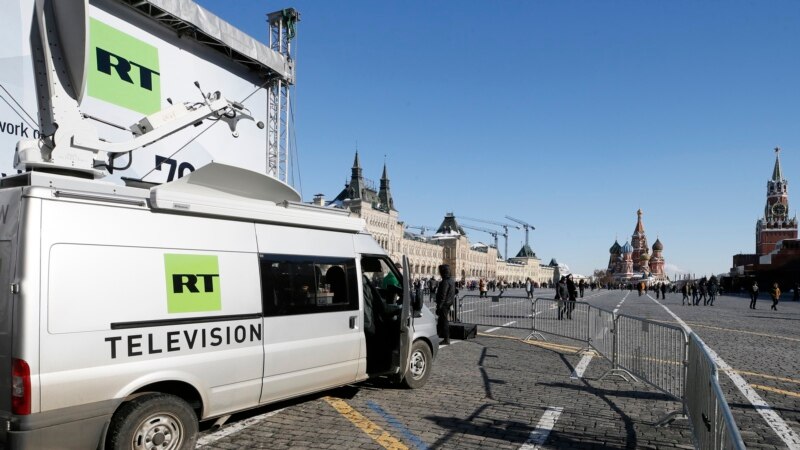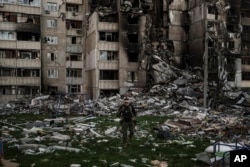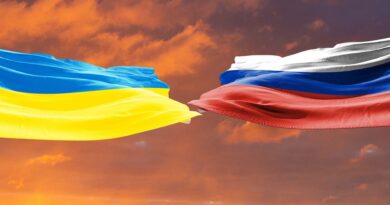No, Mr. Putin, Europe Didn’t Ban RT for Telling the Truth
While chairing a meeting in Moscow on July 19, Russian President Vladimir Putin spoke about the banning of Russian state media outlets in some Western countries following Russia’s invasion of Ukraine.
During an exchange with Kristel Nean, the editor-in-chief of the pro-Kremlin website Donbass Insider, Putin told her:
“You said: ‘We always tell the truth.’ That is probably the sharpest weapon against lies and propaganda soaked in those lies.”
Nean replied: “This is why they are afraid of us and try to regularly discredit us.”
“Yes,” Putin said. “That’s why they are closing everywhere [what is] in fact our only information resource aimed at a Western audience — that’s Russia Today (RT). They are closing it everywhere, putting obstacles in the way. They are afraid of the truth.”
That is false. While some journalists and academics have opposed banning the Russian media outlets on free speech grounds, RT and Sputnik have systematically spread falsehoods and disinformation about Russia’s war in Ukraine.
In March 2022, the European Union suspended the broadcasting activities of Russia’s state-owned outlets Sputnik and RT. Josep Borrell, the High Representative of the European Union for Foreign Affairs and Security Policy, declared: “Systematic information manipulation and disinformation by the Kremlin is applied as an operational tool in its assault on Ukraine.”
Social media platforms followed suit to comply with European law.
EUvsDisinfo, a project of the EU East Stratcom Task Force, has catalogued thousands of examples of disinformation that Russian state media and pro-Kremlin media have spread about Ukraine and the invasion of Ukraine.
That disinformation has included the following false claims:
The United Kingdom revoked RT’s broadcasting license in March 2022.
Leading up to that decision, the Office of Communications, or Ofcom, which is the U.K.’s communications regulator, launched 29 investigations into claims that RT failed to maintain impartiality in its Ukraine war coverage. Ofcom found RT failed to maintain impartiality in each case.
RT consistently mirrored Kremlin talking points that Russia’s invasion of Ukraine was a “special military operation,” not an invasion.
RT correspondents repeated the false claim frequently made by Russian officials that Russia did not target civilian areas or intend to occupy Ukraine.
For example, in a report that aired on March 1, 2022, RT correspondent Maria Finoshina said:
“But since the beginning of its special operation in Ukraine, Moscow has always been stressing that, uh, Russia has no plans of occupying Ukraine and has no plans to target residential areas or affect ordinary people, [the] innocent civilian population.”
The following day, March 2, 2022, RT news presenter Sean Thomas introduced a clip from an interview with military journalist Viktor Baranets that was dubbed into English.
Baranets, mirroring other Russia-state media reports, falsely suggested that Russian airstrikes on a government building in Kharkiv was a Ukrainian false flag attack.
RT has falsely accused Ukraine of committing genocide in Ukraine — a claim included in Moscow’s false pretext for war.
Ofcom said the program Donbass Yesterday, Today, and Tomorrow, which RT aired on March 1-2, 2022, “[r]epeated allegations that the Ukrainian authorities, including its military, were fascists or Nazis who were attempting to commit genocide against Russian-speaking people in the Donbas.”
A live report by RT’s Peter Oliver on March 1, 2022, included the following Russian Foreign Ministry statement, which was not challenged: “The EU has definitely taken the side of the Ukrainian regime, which has committed genocide against part of its own population.”
In March 2022, the International Court of Justice ruled that Ukraine had “a plausible right not to be subjected to military operations by the Russian Federation for the purpose of preventing and punishing an alleged genocide” in its territory.
Russian state media have spread genocidal rhetoric.
In October 2022, Anton Krasovsky, the broadcasting director for RT’s Russian-language service, advocated drowning and burning Ukrainian children alive. Krasovsky was suspended for the comments and subsequently fired.
While the U.S. government did not ban RT, Google-owned YouTube did, citing its policy to prohibit “denying, minimizing or trivializing well-documented violent events.”
However, NewsGuard, a U.S.-based website which tracks misinformation, reported in February 2023 that RT documentaries spreading “egregious falsehoods about Ukraine” had been uploaded more than 250 times across more than 100 YouTube channels.
According to NewsGuard, the documentaries included the false claims that “Ukrainian authorities committed ‘genocide’ of Russian speakers in Donbas; and that ‘Nazism’ is rampant in Ukrainian politics and society.”
Still, the European Federation of Journalists, along with some academics, opposed the Europe-wide ban on RT and Sputnik. Without defending the Russian channels’ content, they argued that government censorship contradicts European values and is an ineffective means of combating disinformation.




